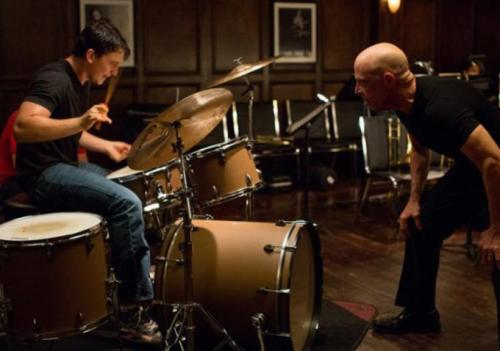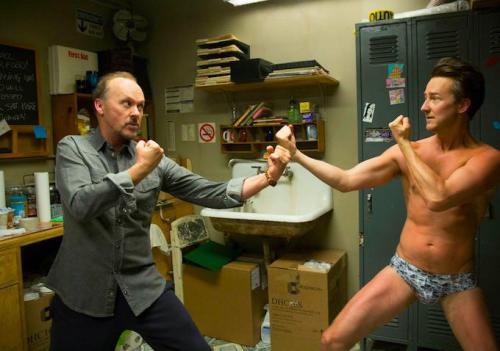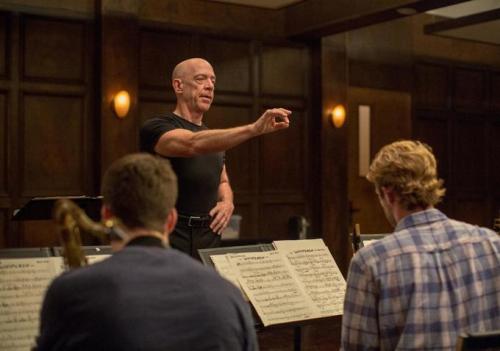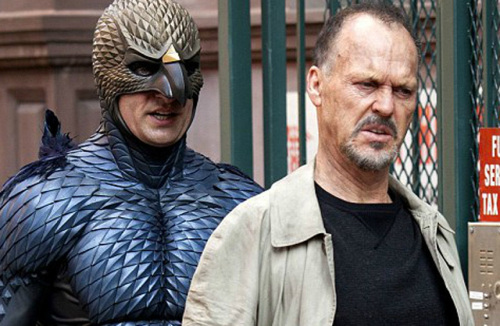Oscar season, like the baseball season I spend much of the year covering, drags on. It’s literally a year-long discussion, and like baseball, has its peak months. We’re entering that stretch now, and it’s an amazing time. Over the next few months, we’ll see a barrage of high quality, high profile “Oscar movies” – a term I dislike because it somewhat discredits (in my opinion) the relative worth of the labeled film as an artistic piece in and of itself. With that being said, my tastes tend to lean towards what might be described as “long shots” – smaller movies with something to say that fall just short of being labeled front runners. (Think Her, Nebraska, and Before Midnight from last year.)
Recently, I’ve taken in two movies that will probably fall by the wayside as the season goes on through no fault of their own, but because they lack the narrative that propels movies like Dallas Buyers Club and the overwhelming weight of 12 Years a Slave.
Whiplash
The sophomore effort of director Damien Chazelle, Whiplash tells the story of a young jazz musician’s brutal tutelage under a cruel teacher. On the surface, this is a story that’s surfaced a lot in recent years, as a developing artist cracks under the pressure demanded by the perfection of their particular medium (see Black Swan). What separates Whiplash is the dark comedy that underlies it, the fervent jazz tempo that drives everything from the acting to the camerawork, and the moral ambiguity of the main theme of the film: how much is too much when pushing to achieve greatness?
 Miles Teller plays Andrew Neiman, a jazz drummer who longs to become one of the all time greats. He’s good – but the real story is J.K. Simmons, who plays instructor Terence Fletcher as a Mepistopholes-esque tyrant, terrifying in tight black t-shirts and shaven head. When Simmons walks into the room, the very atmosphere trembles. It is a layered, textured performance that alternates between serenity, as when Fletcher tells Neiman of his desire to create the next Charlie Parker no matter the cost with no moral ambiguity, and tempestuous violence, as when he brutally auditions three drummers for his studio band until their hands are bleeding. Simmons has a long history of stealing movies while filling out minor supporting roles; here, he dominates the proceedings, deservedly moving to the forefront of the conversation for Best Supporting Actor.
Miles Teller plays Andrew Neiman, a jazz drummer who longs to become one of the all time greats. He’s good – but the real story is J.K. Simmons, who plays instructor Terence Fletcher as a Mepistopholes-esque tyrant, terrifying in tight black t-shirts and shaven head. When Simmons walks into the room, the very atmosphere trembles. It is a layered, textured performance that alternates between serenity, as when Fletcher tells Neiman of his desire to create the next Charlie Parker no matter the cost with no moral ambiguity, and tempestuous violence, as when he brutally auditions three drummers for his studio band until their hands are bleeding. Simmons has a long history of stealing movies while filling out minor supporting roles; here, he dominates the proceedings, deservedly moving to the forefront of the conversation for Best Supporting Actor.
In my mind, Whiplash is fantastic for two reasons. The first is the lack of clear answers within the story. What drives Fletcher to verbally, mentally, and physically abuse his students? Is it his own failed background as a jazz musician? Was there a domineering instructor who did the same to him? Or was he always this way? Does he truly care for his students? The film forces the audience to decide – and I love ambiguity in movies. The second reason is the final fifteen minutes, a daring, masterful sequence with very few lines of dialogue that tells a complete story without ever leaving the room. By the final drumbeat of the film (literally), both characters have been utterly transformed. I won’t spoil it for anyone – just go see the film already. It’s a tight, clever film that isn’t free of mistakes – there’s a laughably bad zoom on Neiman during a quieter moment that’s straight out of a 70’s grindhouse movie – but gives audiences enough room to draw their own meanings about a dark portrait of artistic obsession.
Birdman
Meanwhile, Birdman is a hot mess. It’s entertaining as hell, and a wonderfully meta-piece of fiction, but boy, is it a hot mess. The film’s given title, Birdman: or the Unexpected Virtue of Ignorance, seems as though it should emblazon a ridiculously pretentious piece of cinema with many things to say about the virtue of theatre over the morass of modern film. This is true. It’s also a film filled with Edward Norton dick jokes. So that’s a thing.
The story of actor Riggan Thompson, a one-time superstar famous for playing the fictitious superhero “Birdman” who has turned to the theatre as a means of jump-starting his career, is imbued with deeper layers of meaning by casting Michael Keaton in the title role. The erstwhile Batman has fallen into a sort of B-list purgatory in recent years, and he rises to the occasion here. He never goes full-on Beetlejuice, but it’s impossible to watch this without remembering why Keaton is famous in the first place. He’s good, and in a lesser year, he would be a serious Best Actor Oscar contender. (It’s too early to tell, but suffice to say, both he and Edward Norton are fabulous.)
Director Alejandro González Iñárritu is notorious for weighty work such as Babel and 21 Grams, super-serious films that discuss the Meaning of Life in Serious Tones. Here, he abandons that for some of the blackest comedy to strike the silver screen this year. Consider: Riggan is cracking because his star his fading, but also because he’s tormented by the voice of his former superhero alter-ego, and because he might have actually developed super powers, something demonstrated when he drops a spotlight on a floundering co-star’s head rather than fire him. Like I said, this movie’s a hot mess, but it’s damned entertaining.
 The supporting ensemble is worthy of a peak Robert Altman film, featuring Zach Galifianakis, Amy Ryan, Emma Stone, Naomi Watts, and a brilliant Norton to magnificent effect. At no point do any of their characters feel short-shifted, even as the film revolves around Keaton. Cinematographer Emmanuel Lubezki uses a variety of tricks to make it feel as though the camera is performing one long, continuous take, a la Hitchcock’s Rope. It’s a bit too gimmicky for its own good, but it works well enough that it doesn’t get in the way of the story.
The supporting ensemble is worthy of a peak Robert Altman film, featuring Zach Galifianakis, Amy Ryan, Emma Stone, Naomi Watts, and a brilliant Norton to magnificent effect. At no point do any of their characters feel short-shifted, even as the film revolves around Keaton. Cinematographer Emmanuel Lubezki uses a variety of tricks to make it feel as though the camera is performing one long, continuous take, a la Hitchcock’s Rope. It’s a bit too gimmicky for its own good, but it works well enough that it doesn’t get in the way of the story.
In spite of Keaton’s fervent energy, the film loses speed somewhere around the final third, which brings down what has been until that point a tornado of madness. It especially suffers when the proceedings are bogged down by the abhorrent questions of its central thesis (Something like “WHAT IS THE MEANING OF ART?”). The ending is marvelous, though, forcing the audience to ask if Riggan is free of his obsessive, Ahab-like quest, or if he’s simply become enmeshed in his character again. Is he free? Who knows? But that’s not the point. The point is: it’s a massively fun ride. And a welcome introduction to what we might now call “Oscar season.”
(All images courtesy of indiewire.com)







